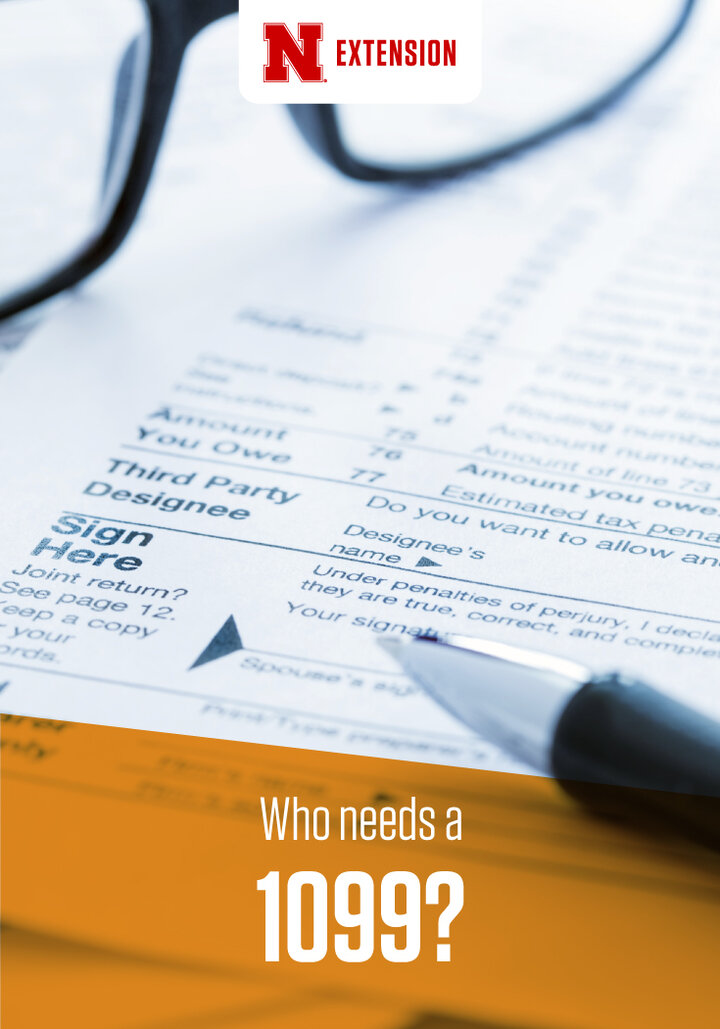After the first of the year, many farmers and ranchers issue IRS 1099 forms as required by law. The big question becomes “Who am I required to send one to?” There are many misconceptions about who you are required to issue 1099s to. Along with that, what happens if a 1099 is not issued when it should have been? Let’s try to clear up some of these questions.
Farmers and ranchers (or any other businesses) are required to issue 1099s for any payments of $600 or more made in the course of their trade or business. This basically means that if you are deducting that cost on your tax return, your need to issue a 1099. For example, if you pay a contractor for repairs on your barn, that would be a deductible expense and you would need to issue a 1099 for the cost of that service. However, if that same contractor did repairs on your house, you would not issue a 1099 for that service because it was not a deductible expense for your business.
A 1099 needs to be issued for any of the following:
Rent. This would include pasture rent, corn stalk rent, machinery rent, building rent, and cash rent, but not any value of a share rent.
Services Performed by Someone Who is Not Your Employee. This would include machine hire such as custom harvesting or planting, director’s fees paid by a company, or any other type of custom hire or contract labor.
Veterinary Fees. These include payments for services and supplies. If you have a veterinary clinic from which you only buy supplies and don’t access services, you would not be required to issue a 1099 to them. This requirement for veterinary services was implemented as part of the Affordable Care Act. Watch for further guidance on this if the ACA is repealed.
Attorney’s Fees. Any payments made to attorneys in the course of your trade or business require a 1099 to be issued. If you pay them for personal services such as a divorce, you would not be required to issue a 1099.
Interest on Loans Not with a Financial Institution. If you borrow money from an individual or entity that is not a financial institution, such as bank, you are required to issue a 1099 for the interest paid on that loan if the amount was more than $600.
Dividends. If a corporation pays dividends to shareholders, they are required to issue a 1099. Unlike the $600 threshold on the above payments, the threshold for dividends is $10.

1099 Requirements for Corporations & LLCs
In general, you are not required to send 1099s to corporations; however, you are required to send a 1099 to attorneys and veterinarians, regardless of their corporate status. A common misconception is that LLCs are corporations. LLC stands for Limited Liability Company, an entity established under state law but is not a recognized entity by the IRS. An LLC by default is taxed as a partnership. However, the election can be made to be taxed as a corporation. The 1099 filing requirement is based upon the tax filing status of the entity. Therefore, an LLC taxed as a partnership is not exempt from being issued a 1099, while an LLC taxed as a corporation would be exempt.
Gathering Data for 1099s
A growing problem is gathering the required information to report on the 1099s. You are required to have the name, address, and ID number (EIN or SSN) of the recipient you paid. Some recipients are unwilling to provide this information. To solve this problem, you should issue a W-9 to any individual or business you will be paying that requires a 1099. This should be given to them to fill out and return to you before you make payment. These forms are available on the IRS website. If they refuse to provide the needed information, you are required to withhold 28% as backup withholding. For more information on backup withholding, consult with your tax professional.
Why 1099s are Required
Filing and issuing 1099s may seem like a big hassle. Why are we required to do so? The 1099 system is designed to prevent under reporting of income. When a 1099 is filed with the IRS, it allows the IRS to match income reported on their tax returns. The IRS does what it can to prevent this under reporting of income and is pushing Congress to expand 1099 reporting. The IRS has estimated that underreporting of individual income tax (including self-employment tax) is over $300 billion!
Penalties for Not Filing 1099s
There can be severe penalties for failing to file with the IRS and failing to furnish 1099s to recipients. The maximum penalty for failure to file is $260 per form and failure to furnish is another $260 per form. If the IRS finds “intentional disregard” of either of these, the maximum penalty increases to $530 each. Therefore, the penalty per form could be $1,060! As you can see, the IRS is getting serious about the 1099 reporting issue. If you haven’t been issuing 1099s as required, now is a great time to start! The filing deadline for furnishing a 1099 to recipients is January 31. Likewise, the deadline for filing 1099s with the IRS is also January 31.
Final Note
Each individual tax situation is unique. Please contact your tax professional with further questions or guidance.
Anthony Barrett is a farm financial consultant at Nebraska Farm Business, Inc. He can be reached at anthony@nfbi.net.

